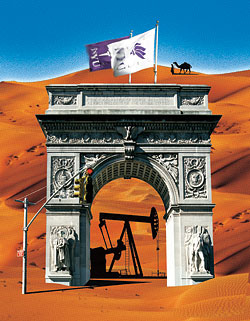NYU President sells out to Dubai to follow the scent of Petrodollars!
The Emir of NYU
Hat tip-Esther R.
NYU president John Sexton has been promised a blank check to duplicate his university on a desert island in Abu Dhabi. The expansion will leave both campuses flush with petrodollars. But to many faculty, the deal amounts to a sellout.
- By Zvika Krieger
 |
|
Illustration by Henry Janson
(Photo: Jeremy Horner/Getty Images (desert); Michael Pasdzior/Getty Images (Washington Square Park); Corbis (oil well); Courtesy of NYU photo bureau (NYU flags))
|
John Sexton’s office, which sits on the top floor of NYU’s Bobst Library and boasts an impressive view north to Washington Square Park, has recently begun to resemble a shrine to Abu Dhabi. The university president has installed a massive Oriental rug, a gift from the crown prince, on one entire wall. On another hangs a framed portrait of the sunglasses-clad founder of the United Arab Emirates, Sheikh Zayed bin Sultan Al Nahyan. In the center of the room is a large framed photograph of an Emirati woman, hand covered in a henna tattoo, gazing provocatively from behind a sequined veil.
When we start to talk about NYU’s expansion plans in Abu Dhabi, Sexton props his sneakers up on the coffee table, then folds them beneath his chair, kindergarten style. He looks uncomfortable, as if he’d rather play the schlumpy college professor—unkempt hair, rumpled clothes, rotund paunch—than a global tycoon. And over the next two hours, Sexton tries to downplay his own role in the university’s Abu Dhabi plans. But he just can’t help himself.
Within less than three years, NYU plans to more or less clone itself in Abu Dhabi, thereby becoming the first major U.S. research institution to open a complete liberal-arts university off American soil. It is a wildly ambitious project, far more grandiose than simply opening up a foreign branch or study-abroad program. Unlike any other major American university, NYU will treat its offshore campus as virtually equal to its New York campus. NYU Abu Dhabi students will be chosen by the same admissions procedure, and will graduate with the same degrees, as their Washington Square colleagues. Eventually, Sexton hopes that New York and Abu Dhabi will serve as two nodes for a global network of NYU programs and classes.
The financing of the deal is equally extraordinary. The city-state of Abu Dhabi, having already committed a $50 million “gift” (effectively a down payment) to the university, has promised to finance the entire Middle East campus and a good deal of NYU New York as well. “This is not just study abroad on steroids,” says Marcelo Suárez-Orozco, a professor of globalization and education at NYU. “This is really upping the ante. It will be a complete game-changer for higher education as we know it.”
And despite his protestations, it is impossible to imagine NYU’s initiating this expansion without John Sexton at the helm. The president has taken the thirteen-hour flight to the desert emirate four times over the past two years to personally broker the deal with the crown prince of Abu Dhabi. He refers to his trips there as a “spiritual experience” and sees the project as honoring his late wife.
When NYU opens its Abu Dhabi Institute (a precursor to the full-fledged campus) this fall, Sexton himself will be teaching one of the first courses—traveling from New York to Abu Dhabi and back every other weekend. “I can’t wait to teach my class over there,” he exclaims, his face flushed with excitement as he throws his feet up in the air and falls back in his chair.
NYU Abu Dhabi may be global in ambition, but that ambition is plainly born of one man’s psychology. Sexton is well known for his obsession with his better-endowed competitors (he refers often to Harvard, Yale, and Princeton as “the holy trinity”), his conviction that NYU must make bold moves, and, consequently, his enormous tolerance for risk. “This is a deal between two kings—the emir of Abu Dhabi and the emir of NYU,” says one senior professor who has been lobbied aggressively by Sexton to support the project. “But one ruler certainly has more to lose than the other.”
Sexton admits he is worried whether, as he puts it, “I have the leadership capability to explain adequately to my colleagues what we’re doing.” Indeed, the project has faced particular criticism among a faculty that has often found itself at odds with Sexton’s empire-building. “Of all of Sexton’s projects, Abu Dhabi is really the one where professors are drawing the line,” says Andrew Ross, chair of the NYU chapter of the American Association of University Professors.
Many professors fear that, as sociology professor Craig Calhoun puts it, NYU is “creating a second-tier version of itself,” spreading itself too thin and turning the university into an academic chain restaurant—“a conglomerate with a number of wholly owned subsidiaries.” Others object not just to the risk of brand dilution but to Sexton’s wholesale embrace of a regime with a troubling history regarding academic freedom and human rights (not to mention the state of Israel). Similar entreaties by Arab states have recently been rejected by other American universities; why, critics wonder, has NYU’s president not been dissuaded?
Categories
Archives



